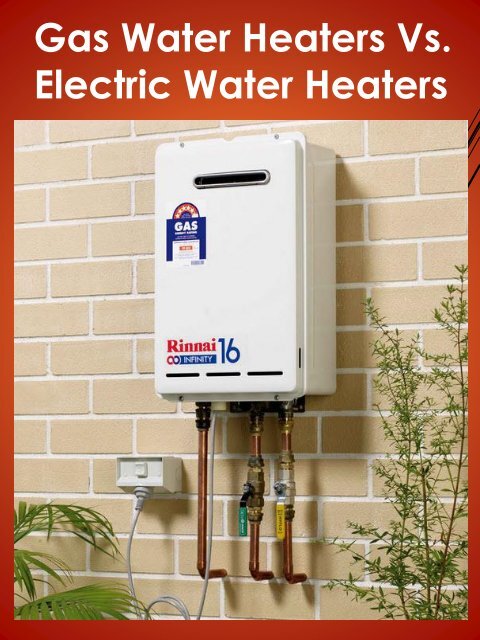Gas Water Heaters Vs. Electric Water Heaters
Create successful ePaper yourself
Turn your PDF publications into a flip-book with our unique Google optimized e-Paper software.
<strong>Gas</strong> <strong>Water</strong> <strong>Heaters</strong> <strong>Vs</strong>.<br />
<strong>Electric</strong> <strong>Water</strong> <strong>Heaters</strong>
Given a level playing filed---which in this case means a supply<br />
of natural gas as well as electricity to your house---the<br />
competition between electricity and gas is very one-sided.<br />
The cost of producing a gallon of hot water is so much<br />
cheaper with gas---whether natural or propane---than it is<br />
with electricity that if you have the choice you should always<br />
choose gas.<br />
Can You Choose <strong>Gas</strong>?<br />
If you don't have natural gas in your house, a natural gas<br />
heater is obviously not an option---but a propane one is,<br />
particularly if you are using it already for heating and/or<br />
cooking. What's more, the savings on either fuel compared<br />
with electricity are so great that unless your heater is going to<br />
receive only light and occasional use, it will be worth your<br />
while to pay to have existing natural gas or propane lines<br />
extended to reach the heater.<br />
Speed of Heating<br />
<strong>Gas</strong> is a much faster means of heating water than electricity.<br />
This means that, size for size, a gas heater is capable of<br />
producing more hot water more quickly than an electric<br />
heater.<br />
Purchase and Running Costs<br />
<strong>Electric</strong> water heaters are slightly cheaper than gas ones, but<br />
natural gas is typically about half as expensive as electricity as<br />
a fuel for heating water, and propane is also much cheaper.<br />
Your maintenance costs are potentially somewhat higher for<br />
gas, since you will need to have a professional to do it,<br />
whereas it is possible to carry out routine maintenance on an<br />
electric water heater yourself. Overall, though, the difference<br />
in the actual cost of heating water is so great that gas wins<br />
every time.
Safety<br />
Because gas heaters involve combustion, whereas electric<br />
water heaters don't, they are potentially more dangerous. The<br />
process of burning gas uses up oxygen and produces toxic<br />
byproducts. Under normal circumstances, the levels of these<br />
that are produced are minimal and harmless. If you neglect<br />
maintenance, however, that can change---and there is even<br />
the small risk of explosion. Maintain your gas heater properly<br />
to avoid these risks, and make sure that you have functioning<br />
smoke and carbon monoxide alarms installed.<br />
Capacity Isn't Everything<br />
•Whatever type of heater you buy, bear in mind that there is<br />
more to your choice than mere capacity. Every heater has<br />
what is known as an FHR, a "first hour rating," that tells you how<br />
much hot water it can produce in an hour of use. For most<br />
people, this is a far more useful gauge of whether a heater will<br />
give you the hot water that your usage patterns demand.<br />
Warranties Tell You Something<br />
•Paying for a heater with a longer warranty is usually a good<br />
investment. The longer a heater's warranty, the better its<br />
insulation and the bigger its burner or heating element is likely<br />
to be.<br />
The Bottom Line<br />
•<strong>Gas</strong> is best if you can have it. <strong>Gas</strong> heaters are so much more<br />
efficient that if you have gas available, you should always<br />
choose one. They are safe if properly maintained, and will<br />
heat your water more quickly and cheaply.<br />
Article Source: Ehow<br />
Image Source: The <strong>Gas</strong> Showroom Website




